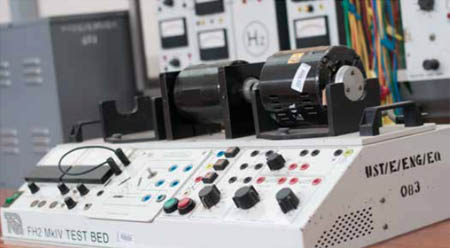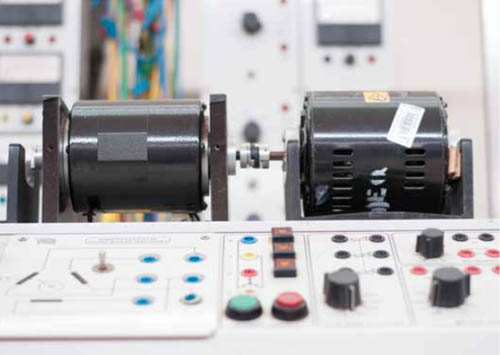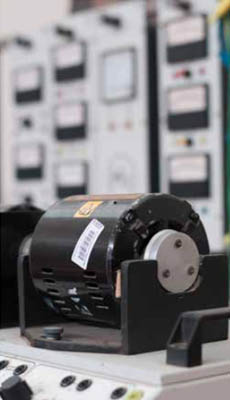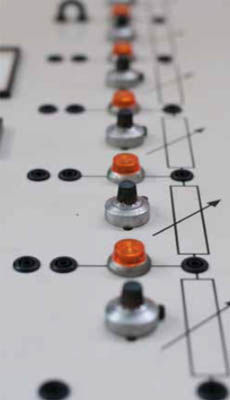Electrical & Electronic Engineering
The Department of Electrical & Electronic Engineering was established in 1952. Till quite recently, it was the only institution which was training professional electrical and electronic engineers for the Ghanaian economy. Over the years, the Department has produced a large number of engineers who occupy important positions in the Telecommunication, Power, Manufacturing, Mining and Computer sectors of industry as well as other sectors of the Ghanaian economy. Very sensitive organisations in the country like the VRA, the ECG and GRIDCO have almost their entire electrical engineering workforce consisting of graduates from this Department. Today the Department is at the forefront of providing the nation’s manpower needs in electrical, electronic and telecommunication engineering and continues to be the main source of electrical, electronic and telecommunication graduate engineers for the nation.
The following are the research grouping in the Department
Power Systems Engineering Research Group
Engineers working in this group focus on the three main subsystems of electric power system, namely generation, transmission and distribution sub systems. Power systems engineering deals with the planning, design, analysis, protection, operation and control of the sub systems to give secure and economic power supplies. The job of a power system engineer also involves the design of related devices including transformers and electric power generators. Important research areas in this area include power transformers, power generation, power transmission and distribution, power system planning, high voltage engineering, power system protection, transmission and distribution substations.
Power Electronics, Electrical Machines and Drives Research Group
Power electronic engineering involves the design, analysis and development of electronic circuits using high-power switching semiconductor devices. These circuits are used for the control and conversion of electronic power. They are found in applications in the area of power supplies, energy conservation, process control and factory automation, transportation, welding and induction heating equipment and high voltage dc transmission systems.
One major application of power electronics is the electric drive. The electric drive is made up of electrical machine, power electronic converter and associated controller. Electric drive engineering deals with the design, analysis of electrical machines
and their control systems. The electric drive system is widely used in industrial and domestic applications. It is also widely used in wind energy converters, electric trains, automobiles and aircrafts.
Electronic Engineering Research Group
Electronic engineering involves the design of electronic circuits, devices and systems using components such as diodes transistors and integrated circuits. It is a broad engineering area covering subfields such as analogue electronics, digital electronics, consumer electronics, embedded systems and power electronic. It intersects with all other fields in electrical engineering.
Control Engineering Research Group
Control engineering deals with the modeling of dynamic systems and the design of controllers for the systems so as to cause them to behave in the desired manner. Controllers are implemented using passive elements, signal processors, microcontrollers, programmable logic controllers, etc. control engineering plays a vital role in industrial

automation and has many other application areas. Examples are the flight and propulsion systems of commercial airliners and the cruise control in modern automobiles.
Mobile and Wireless Communication Research Group
Mobile and wireless communication engineering is a fast moving field of telecommunication engineering. It is concerned with the concepts, application, design, development and deployment of mobile communication systems and networks (networks which do not use cable or wire for interconnections). It involves expertise
in several inter-related subfields such as physical layer transmission technology (radio engineering, signal processing, synchronization, equalization, channel coding), wireless access technology, radio resource, mobility management and industrial standards.
Data Communication and Network Research Group
In data communication, data is electronically exchanged between two or more computing or communicating devices along data connections established between them. The data connections, consisting of either cable or wireless media are referred to as data communication or computer networks. Data communication and network engineering is a field in telecommunication engineering that deals with the planning, designing, testing, implementation, operation and evaluation of data communication networks. It involves expertise in network topologies, distributed computation, computer networking, communication software, security issues related to communication etc.
The active research areas which is currently been carried out in the Department includes:
- Optimal design of isolated power systems
- Electrical impact assessment of solar photovoltaic distributed generation in grid- connected networks
- Transient stability status prediction in power systems
- Tracking of maximum power point of solar panels
- Wireless network optimisation
- Data communication and
- 4th generation network deployment



The following are some research projects completed in the Department during the year under review
- Load factor assessment and Evaluation on the performance of MIMO WCDMA Rayleigh Interference Channel.
- The challenges of Youth ICT Entrepreneur in Developing Countries: Case Study- Ghana.
- Adaptive congestion control for wireless Sensor Network.
- Radio Planning and field trial measurement for 4G WiMAX network in a Sub- Saharan African Environment.

